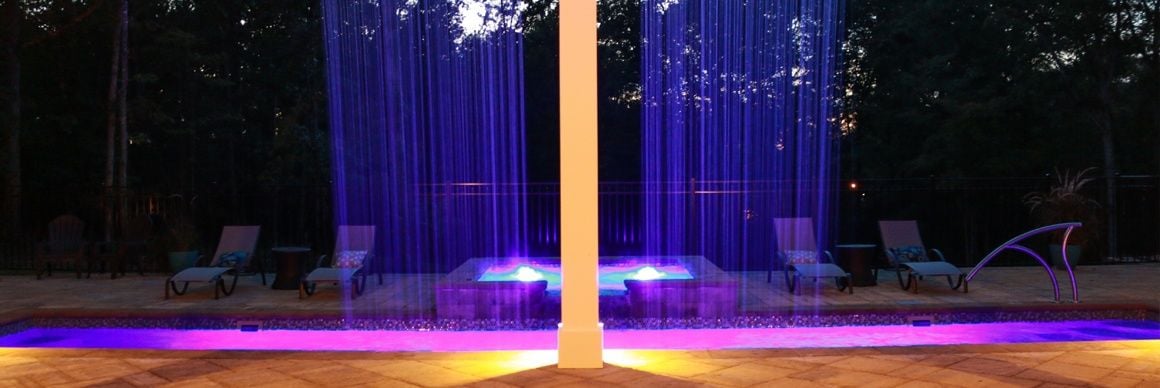
Fiberglass vs. Vinyl Liner vs. Concrete Pools: An Honest Comparison
Is there an unbiased comparison of fiberglass inground pools, vinyl liner pools, and concrete pools on the internet?
An individual who recently reached out to me doesn't think so. He stated in an email:
As you're no doubt well aware, it's a desert wasteland when trying to find information on pools... Sorting through the internet for usable information is difficult in the extreme. Of the few forums I've found, most devolve into trolls arguing gunite pools vs. fiberglass pools vs. vinyl liner pools - over and over and over and over.
"What would help a great deal is to find some kind of unbiased information that explains each pool in detail and then backs off - letting me (or the customer) make the final decision."
This article is my effort to provide an objective source of information about the three types of inground swimming pools.
The approach is simple. I list the advantages and disadvantages of fiberglass inground pools, vinyl liner pools, and concrete pools...then back off so you can form your own opinion.

Fiberglass vs. Vinyl Liner vs. Concrete Pools
Vinyl liner pools have a lower initial cost and a customizable shape, but you’ll likely need to replace the liner within 5-10 years. Fiberglass pools are easier to maintain, quicker to install, and very durable. They cost more upfront and aren’t as customizable when it comes to shape. Concrete pools are extremely durable and customizable but require more maintenance, have higher maintenance costs, and have the longest installation process.
Want to decide for yourself which type of pool would be perfect for your backyard? Take our Pool Type Quiz now! You'll get answers in just a few clicks... just tap the button below to get started:
Fiberglass Pools Pros and Cons
Pros of a Fiberglass Pool
- Lower maintenance (versus other pool types)
- Lower lifetime cost*
- Non-abrasive surface
- Popular Features Built-in (ledges, benches, seats)
- Potentially Quicker installation
Lower maintenance
The gel coat surface of the fiberglass pool shell doesn't have big pores and cavities.
This inhibits algae's ability to attach to the surface and can reduce the amount of sanitizing chemicals required to maintain the pool.
Lower lifetime cost*
As long as proper water chemistry is maintained according to the fiberglass pool manufacturer, fiberglass pools should not require major rework, unlike vinyl liner or gunite pools.
Non-abrasive surface
The gel coat surface of fiberglass pools is smooth to the touch. Pool toe should be a thing of the past!
Popular Built-in Features
Most fiberglass swimming pool designs have popular pool features like tanning ledges, benches, and seats already built in.
Quicker installation
Because the shells of fiberglass pools are manufactured off-site, and arrive at your home in a single piece, the installation process can be quite fast compared to vinyl or concrete pools. You may even be surprised how quickly the pool shell itself is installed in the ground and full of water!

Want to see about how much that cost will be with all your favorite pool accessories?
Use our Design and Price Tool to walk through your options and approximate price!
Cons of a Fiberglass Pool
- Limited shapes and swimming pool designs
- No wider than 16'
- Repairs on some colored finishes may not match
- Higher initial cost
Limited shapes and swimming pool designs
Because fiberglass pools are built from a mold, the consumer is limited to the shapes and sizes offered by the various fiberglass pool manufacturers.
No wider than 16'
Fiberglass pools are built as one piece and shipped via the road. Shipping restrictions limit the width of the fiberglass pool shell to 16 feet.
Repairs on some colored finishes do not match
Many fiberglass pool manufacturers use colored finishes that are difficult to match in the unlikely event that a repair is needed.
Higher initial cost
Fiberglass pools are more of an initial investment—about $20,000 more than vinyl liner pools and generally about the same as concrete pools, according to builders we spoke with from around the country.
Vinyl Liner Pools Pros and Cons
Pros of a Vinyl Liner Pool
- Lower initial cost
- Customizable shape and size
- Non-abrasive surface
- Doesn't foster algae
Lower initial cost
Vinyl liner pools typically have the lowest initial swimming pool cost, making them a potentially more accessible entry point for owning an inground pool.
Customizable shape and size
There are virtually no limitations for the length, width, and depth of vinyl liner pools. Because the liner itself is manufactured to size and shape specifications, homeowners who seek control over the customization of their inground pool find appeal in this type of pool.
Non-abrasive surface
The vinyl liner material is smooth to the touch and pleasant to walk on.
Doesn't foster algae
The smooth surface of a vinyl liner pool makes it difficult for algae to attach itself. When you encounter algae, and you will at some point, we believe it will be fairly easy to remove the algae from surfaces with an appropriate brush.
Cons of a Vinyl Liner Pool
- Higher lifetime cost
- Liner warranties may be prorated
- Have to use the pool with care to prevent punctures or tears of the liner
- Lower resale value
Higher lifetime cost
Builders indicate on average, a vinyl liner will last about 7 years. Each replacement can cost $2,500–$3,500 plus the cost of water. It usually adds up to about $4,000–$4,500.
Liner warranties may be pro-rated
We have heard many vinyl liner manufacturers have a 20-year prorated warranty. Be sure to read the fine print so you understand how much will be covered under warranty as the liner ages.
Have to use the pool with care
The liner is generally only 20–30 mils thick, which is the thickness of several sheets of paper. It's not as likely to be able to withstand incidental encounters with pointed objects, compared to fiberglass or concrete pools. For example, pet claws, certain pool toys, tree limbs that may fall in as a result of a storm have all been known to puncture vinyl pool liners.
Lower resale value
When you go to sell a home with a vinyl liner pool, one of the first questions that may be asked is "How old is the liner?"
If it's more than 3–4 years old, there's a significant chance the potential buyer will request you replace the liner before the sale of the house, or the value of the pool may depreciate.
Concrete Pools Pros and Cons
Pros of a Concrete Pool
- As big as you want
- More flexibility with swimming pool design features
- Works of art
As big as you want
Concrete pools can be any size, shape, or depth.
More flexibility with swimming pool design features
Customized vanishing edges, beach entries, tanning ledges, and more, are all just a sketch away from reality with concrete pools. Being built on-site means the possibilities are virtually endless.
Works of art
Concrete pools can be integrated into design as a literal work of art in the landscape.
Cons of a Concrete Pool
Unfortunately, the flexibility concrete allows from a design perspective comes with a price.
- Higher lifetime cost
- More chemical use
- More maintenance
- Longer install time
Higher lifetime cost
Based on what we've seen, it seems that you should plan to have your concrete pool refinished every 10–15 years on average. This involves resurfacing and re-tiling the pool at an expense of $10,000–$20,000 or much higher, depending on the pool. Your pool's surface may deteriorate sooner or last longer, but knowing these potential costs upfront is helpful.
More chemical use
Because the surface of concrete pools is very porous, more chemicals and filtration are required to prevent algae. The alkalinity of the pool shell also constantly raises the pH of the water, requiring you to frequently add acid to counteract the effect.
More maintenance
You also need to frequently broom or sweep a concrete pool with a pool brush to dislodge dirt from the pores of the plaster or aggregate surface, and to help keep algae at bay.
Longer install time
Installers tell us that concrete pools take longer to install...usually 3–6 months on average. Most concrete pools are built using the gunite process, which requires skilled technicians to spray concrete onto walls and other interior pool surfaces at high pressure.
Still trying to decide between concrete, vinyl liner, and fiberglass for your perfect pool? Take our Pool Type Quiz now and get answers in minutes. It's free and fast -- just click the button:
Key Takeaways
Each of the three types of inground swimming pools—fiberglass, concrete, and vinyl liner—comes with its own set of advantages and disadvantages.
Pros and cons of fiberglass pools
Fiberglass pools can require less maintenance in comparison to other inground pool types, can typically be installed quicker, are very durable, and can be beautifully designed. However, their initial cost can be higher than vinyl liner pools, and the shapes and sizes are not customizable.
Pros and cons of vinyl liner pools
Vinyl liner pools have a lower initial cost and a highly customizable shape, but the biggest disadvantages include having to replace the liner every several years, the possibility of puncturing the liner, and some liner warranties being prorated.
Pros and cons of concrete pools
Concrete pools are extremely durable and allow for a highly customized size and shape. The disadvantages include more effort to maintain, more chemical usage, highest cost of ownership, a rougher interior surface, and a slower installation time.
Still have questions about these three types of inground swimming pools? If so, contact us directly or comment with your thoughts below!
And don't forget to download your free copy of our ebook, "Comparing Fiberglass, Concrete, and Vinyl Liner Pools in the Modern Age."
Up Next:
What is the Best Rectangular Fiberglass Pool Design?
What’s the Best Small Fiberglass Pool for Your Needs? Costs, Sizes, Features
Editor's note: This article was originally written by Jason Hughes and was updated on May 17, 2024, with current information. River Pools is a brand of inground fiberglass pools produced in a manufacturing facility in Fortville, IN. While our expertise is in manufacturing fiberglass pools, we have access to a network of installers with expertise relating to project design, installation, and pool service. We often tap into this knowledge base and share information freely with homeowners, just like you, considering installing a swimming pool in your backyard.







